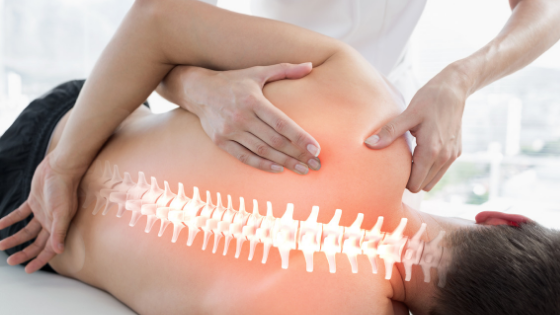I want you to live a fulfilled and successful live- you can only achieve this without neglecting the status of your health, one of those areas, is your SPINE HEALTH.
First let’s dive in a bit of information about our spine.
The spine provides the structural framework to the entire body. The spinal cord runs through the middle of the spine and serves as the main highway of the nervous system by connecting the brain with other parts in the body.
Simply put, most every movement originates from your spine, so taking care of your cervical (upper) and lumbar (lower) spine
There are a few fairly straightforward ways for you to protect your spine health every day:
- Watch your technique when lifting. If you don’t have the proper form when picking up heavy objects, you may twist the wrong way and damage your spine. To lift correctly, stand as close to the object as you can and use your legs and knees as opposed to your back and upper body to lift the item. If the item is too heavy for you, get help and don’t attempt to lift yourself.
- Get a good night’s rest.Your body repairs itself while you sleep. It’s important to get enough sleep to allow for complete healing. Also, try sleeping on your side instead of on your stomach – as sleeping on your stomach puts extra pressure on your spine. A supportive mattress and pillows promoting proper alignment of the spine and neck are also good investments.
- Stay active and stretch regularly. Maintaining an active lifestyle can help lower your risk for experiencing low back pain. Optimal exercise routines involve a combination of aerobic activity, core strengthening and stretching. Stretching to stay flexible also helps to promote good joint function and range of motion, which helps to promote spine health and reduce your overall risk for injury.
- Treat yourself to a massage. If you’re nursing a back injury, a good massage can help encourage blood flow to the affected area. This may bring healing nutrients to help speed up the recovery process. Ask your physical therapist about the use of manual therapy in recovery techniques.
- Maintain a healthy weight. Carrying around excess weight can strain the lower back due to added stress on the muscles, ligaments and tendons in the spinal area. Diet and exercise are the main ways to maintain a healthy weight.
- Stay hydrated. Staying hydrated helps to maintain soft tissue elasticity and fluidity in the joints, which is important for spinal discs to keep their height. When spinal discs shrink due to dehydration, you can become more likely to suffer from a painful disc condition such as a herniation or bulging discs. Water contributes to overall structural health.
- Always get a spine check from your trusted phyical therapist. Get a regular phyiotherapy treatment- it provide a valuable boost to your over-all health and wellness.
A healthy spine is essential in sustaining overall body health.
Any spinal irritation or ill-alignment can cause issues within the central nervous system and outer spinal nerves. Subsequent effects of an unhealthy spine could also potentially lead to weakened muscle systems, muscle aches, headaches, migraines, joint problems, poor concentration, sleep disorders, chest pain and more.


